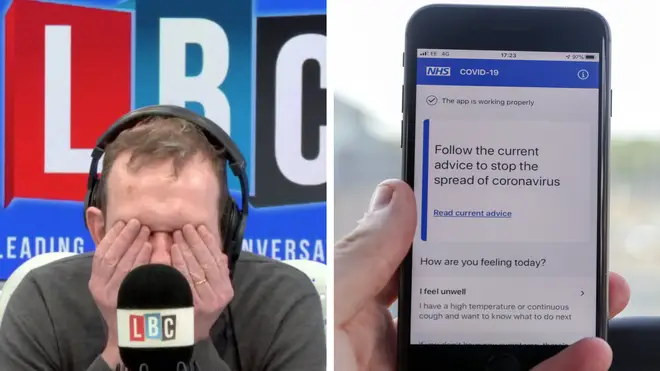
Nick Ferrari 7am - 10am
26 June 2020, 12:24 | Updated: 26 June 2020, 12:26

Engineer explains to James O'Brien why the NHS app "is not fit for purpose"
This engineering journalist explains to James O'Brien why the £12 million NHS app "is not fit for purpose."
The government have not given a launch date for the NHS app which has cost almost £12 million to develop so far, it was revealed in the House of Lords this week.
James O'Brien called it "frightening" that Health Secretary Matt Hancock has now downplayed the importance of the NHS tracing app from an essential factor in the easing of lockdown to "the cherry on the cake" after multiple launch delays.
Especially after yesterday's major incident in Bournemouth where thousands flocked to the coast to enjoy the sunshine, James said. He pointed out that people have been exposed to each other in huge proportions and would be entirely unable to give contact details to a tracer if fallen ill. Here, an app would have been essential.
Engineering journalist Paul Dempsey explained that the UK public have still not seen a functioning app because the government have built a national AI system, which takes a long time to gather information, for an issue which can be prevented much better at a local level.
"If you look at it from an engineering point of view, you've got something that makes perfect sense as a system...but when you actually look at it as it is right now, it's really not fit for purpose.
"It isn't going to do what we need it to do."

James commented, "Yet it remains a primary requisite of a safe loosening of lockdown according to the government's own previous comments and rhetoric."
Mr Dempsey agreed, "This is what's worrying because you can continue to try and fix the app...but actually even then you've got problems."
He explained that due to the way it was built it is inserting stages in the process to slow the process down.
The information from each person's app goes to a central system and is then sent back out on a regional level so there is a significant delay in informing people they have to isolate. Therefore the likelihood of containing the virus is markedly lower.
"You've got something that isn't the way it's supposed to be done and on top of that you see specifically how it's going to delay the way in which contact tracers can actually get information about what is happening with the outbreaks," Mr Dempsey said.
He urged the government to look at the success of Germany's app, which cost £18 million to develop, and reconfigure both the app and the contact tracing system to be managed regionally.